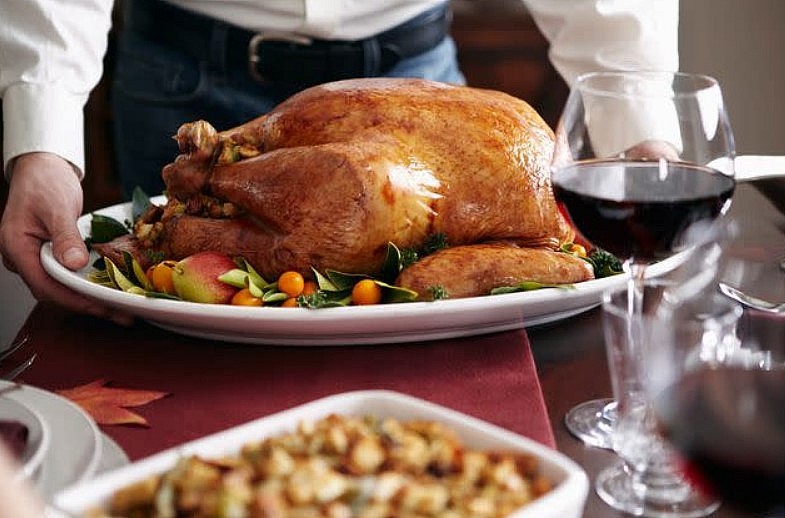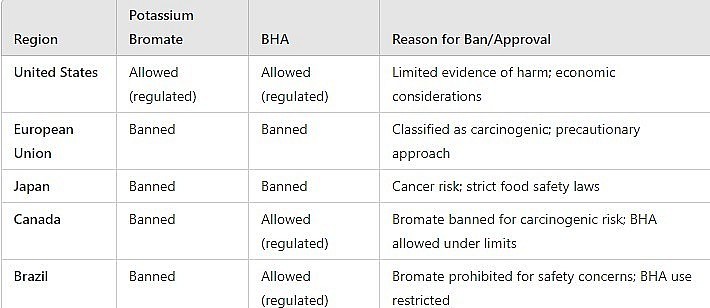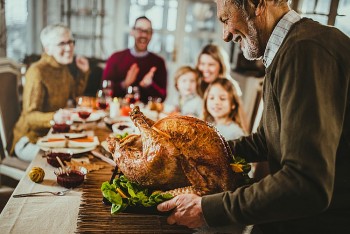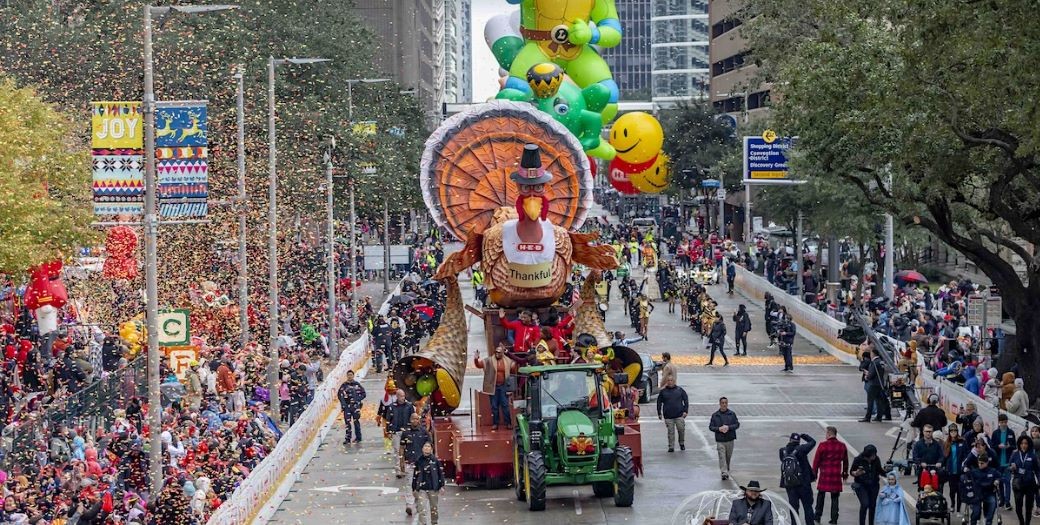Why a Popular Thanksgiving Dinner Staple Is Banned in Europe and Japan
 |
| Thanksgiving dinner staple in the United States is banned in several European countries and Japan |
Thanksgiving is a cherished holiday in the United States, celebrated with family gatherings, gratitude, and an indulgent feast. The centerpiece of this feast often includes turkey, stuffing, mashed potatoes, and an assortment of side dishes. However, one popular Thanksgiving dinner staple has come under scrutiny and is even banned in several European countries and Japan due to health concerns. This raises an important question: what is it about this beloved dish that has sparked such controversy?
The Thanksgiving Favorite in Question
The dish in question is none other than processed canned stuffing and gravy, often used to simplify Thanksgiving dinner preparation. Packed with flavor-enhancing additives, these products have become a convenient choice for many American households. However, some of the ingredients in these products—namely potassium bromate and butylated hydroxyanisole (BHA)—have been linked to cancer, leading to their prohibition in certain countries.
Check more: Thanksgiving Favorites: A List of Foods Restricted Around the World
Comparison Chart: Regulations on Potassium Bromate and BHA
The chart below illustrates the status of potassium bromate and BHA in different regions to clarify their global regulatory differences.
 |
| Comparison Chart: Regulations on Potassium Bromate and BHA |
The Problematic Ingredients
1. Potassium Bromate
Potassium bromate is an additive used as a flour improver in baked goods, including some pre-packaged stuffing mixes. It strengthens dough and enhances the texture of bread, making it a common ingredient in mass-produced bakery items.
-
Health Risks:
Numerous studies have shown that potassium bromate is a potential carcinogen. Research on lab animals indicates that it can cause tumors in the kidneys, thyroid, and other organs. The International Agency for Research on Cancer (IARC) classifies potassium bromate as a "possible human carcinogen."
-
Global Status:
While potassium bromate is still permitted in the United States under certain regulations, it has been banned in the European Union, Canada, Brazil, and Japan due to these health concerns. Manufacturers in these regions use alternative methods to achieve similar results without the risk.
2. Butylated Hydroxyanisole (BHA)
BHA is a synthetic antioxidant used to preserve fats and oils in food products. It's commonly found in gravy mixes, stuffing, and other processed foods to extend shelf life.
-
Health Risks:
BHA has been linked to cancer in lab animals, particularly stomach cancer. While the evidence in humans is not definitive, the U.S. Department of Health and Human Services considers BHA "reasonably anticipated to be a human carcinogen." Prolonged exposure has also raised concerns about its potential effects on hormone regulation and overall health.
-
Global Status:
Like potassium bromate, BHA is banned in the European Union and Japan. In the U.S., it remains approved for use but is subject to specific limits. However, consumer advocacy groups continue to push for its prohibition.
Why Are These Ingredients Still Used in the U.S.?
The U.S. Food and Drug Administration (FDA) allows both potassium bromate and BHA in food products, citing a lack of conclusive evidence to ban them entirely. Regulations require that potassium bromate breaks down during the baking process, reducing its presence in the final product. However, some residual amounts can remain, raising concerns among health advocates.
One reason these additives persist in American food is the regulatory framework. The U.S. often relies on industry studies and cost-benefit analyses that weigh economic factors against potential risks. Additionally, consumer awareness about these additives remains relatively low, which has slowed the demand for change.
How Europe and Japan Approach Food Safety
In contrast to the U.S., Europe and Japan take a precautionary approach to food safety. Their regulatory bodies prioritize consumer health over industry convenience, banning substances with even minimal links to serious health risks. In Europe, the "precautionary principle" guides food safety decisions, erring on the side of caution when scientific evidence is inconclusive.
Japan has similarly stringent food safety laws, focusing on minimizing exposure to harmful chemicals. By banning additives like potassium bromate and BHA, these regions ensure that their citizens are not exposed to potentially hazardous substances.
The Impact on Thanksgiving Traditions
For American families, the potential risks associated with these additives raise an important question: should we rethink our holiday menus? While the convenience of processed stuffing and gravy is undeniable, there are healthier, additive-free alternatives available that preserve the essence of Thanksgiving without compromising safety.
Homemade Alternatives
- Stuffing: Preparing stuffing from scratch using fresh bread, herbs, and vegetables eliminates the need for processed mixes. Not only does this avoid harmful additives, but it also allows for greater customization and flavor.
- Gravy: Homemade gravy made from turkey drippings, broth, and simple seasonings can replace canned or powdered options, ensuring a natural and wholesome addition to your meal.
Raising Awareness: A Consumer’s Role
The controversy surrounding potassium bromate and BHA highlights the importance of informed consumer choices. By reading ingredient labels and supporting brands that prioritize clean, additive-free products, consumers can drive change in the food industry.
Advocacy Efforts
Consumer advocacy groups like the Environmental Working Group (EWG) and Center for Science in the Public Interest (CSPI) are working to raise awareness about these harmful additives. They advocate for stricter regulations and provide resources to help consumers make healthier choices.
Market Shifts
The growing demand for organic and clean-label products indicates that consumers are becoming more health-conscious. Many brands now offer stuffing and gravy mixes free from controversial additives, providing safer options for Thanksgiving dinners.
What Does the Future Hold?
The debate over potassium bromate and BHA is part of a larger conversation about food safety and regulation in the United States. As scientific research evolves and public awareness grows, pressure on regulatory bodies like the FDA may lead to stricter guidelines or outright bans on these additives.
In the meantime, consumers can take proactive steps to protect their health by choosing alternatives, advocating for transparency, and supporting brands that prioritize safety.
Conclusion
Thanksgiving is a time to celebrate gratitude, family, and delicious food. However, the inclusion of potentially harmful additives like potassium bromate and BHA in popular Thanksgiving staples raises important questions about food safety and regulation. While these additives are banned in Europe and Japan, they remain prevalent in the U.S., sparking debate and concern.
By understanding the risks associated with these ingredients and exploring healthier alternatives, families can enjoy a Thanksgiving feast that is both safe and satisfying. As awareness grows, the push for cleaner, safer food options may eventually reshape the way Americans approach not only Thanksgiving but their broader dietary habits.
FAQs: Thanksgiving Dinner Staples and Food Safety
1. Why are potassium bromate and BHA banned in some countries but not in the U.S.?
In countries like those in the EU and Japan, stricter precautionary measures prioritize public health. In the U.S., the FDA allows these additives with specific usage limits, citing insufficient evidence for an outright ban.
2. Are potassium bromate and BHA found in all processed Thanksgiving staples?
No. Some brands offer additive-free options. Always check ingredient labels to confirm the absence of potassium bromate or BHA.
3. What are some trusted brands that avoid harmful additives?
Brands like Whole Foods 365, Simple Mills, and Bob’s Red Mill are known for clean-label stuffing and gravy options.
4. Can I remove potassium bromate or BHA by cooking or reheating?
Potassium bromate may degrade during baking, but residual amounts can remain. BHA does not degrade significantly with heat, so avoiding products containing it is best.
5. What are healthier alternatives to processed stuffing and gravy?
Homemade options are the safest, using fresh bread for stuffing and turkey drippings for gravy. Look for organic or certified additive-free products for convenience.
 Thanksgiving: History, Celebrate and Turkey Thanksgiving: History, Celebrate and Turkey Thanksgiving is a national holiday celebrated on various dates in October and November in the United States, Canada, Saint Lucia, Liberia, and unofficially in countries ... |
 How Many Days Off Do Americans Get for Thanksgiving in 2024? How Many Days Off Do Americans Get for Thanksgiving in 2024? In this article, KnowInsiders’ll dive deep into the holiday itself, the typical work and school schedules, traditions associated with the break, and how different sectors ... |

























